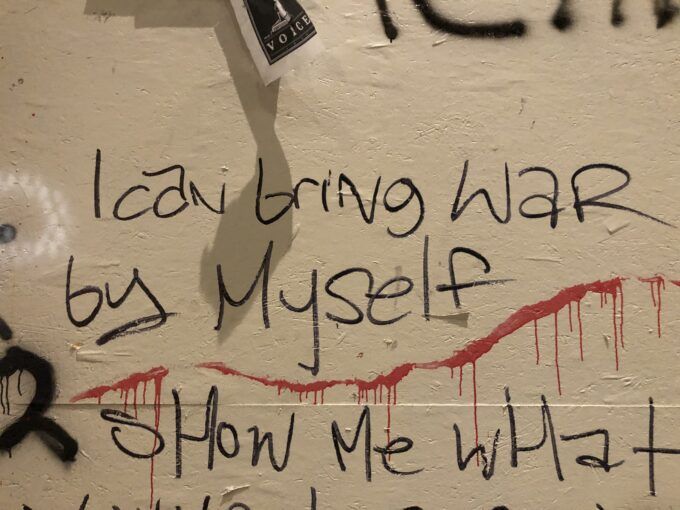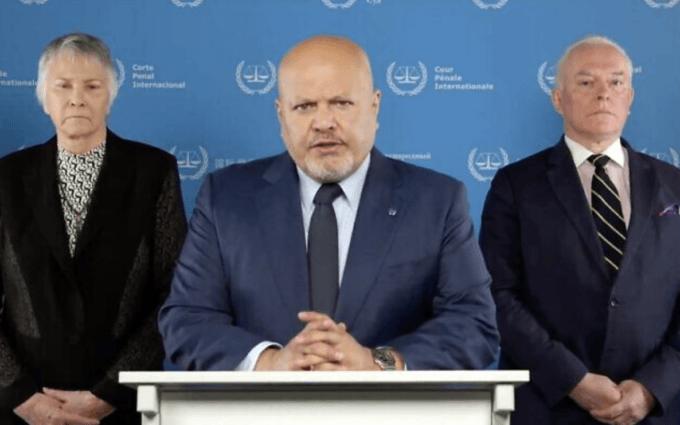Mass Media, Social Media, and the New Civil War
MAY 31, 2024

Photograph by Nathaniel St. Clair
How close are we to being in the movie?
Leila and I went to the Baghdad Theater, down the road from our apartment in Portland, Oregon, to see the new film, Civil War, a few weeks ago. There were a few pieces of dialogue where I wished I could have been on the writing team to make some minor improvements, but overall it was an excellent movie.
The story itself was a good one — at least to the extent that what was happening could really be understood. What was at least as good as the story was how it was told, which was to throw the viewers into the middle of the action and let us try to figure out along the way what’s going on in this familiar but fictional American landscape.
Relentlessly seeing their world from the viewpoint of the immediate was, I think, a brilliant storytelling device for this tale of conflict in particular, because it evoked the sensation we might get from trying to understand world events by looking at our social media feed — with nothing put into context, no history, no sense of place.
The scenario depicted in the film seems like something along the lines of how things might conceivably be going around two years after someone along the lines of Donald Trump refused to abdicate the presidency.
If at any point during the film you thought you had a clear understanding of which of the various political factions, armies or terrorist groups represented what kind of perspective, you’d be thrown for a loop, with moral ambiguity appearing from every direction. If, like me, you’ve become accustomed in the real world or on social media to being attacked by elements of both the right and the left, all the confusion seems exceedingly appropriate.
It seems to me the pressure cooker situation we’re in — designed for us by the combination of an ever-growing divide between the haves and the have-nots along with a political system that facilitates the continuation of that process, a mass media that tries to direct our attention elsewhere, and social media algorithms and censorship practices that have the tendency of siloing us all off into various intolerant sociopolitical sects — has all the ingredients necessary for making the movie a reality. The main elements temporarily lacking are the right political circumstances and the right combinations of authoritarian leaders.
It’s been less than two decades since a handful of billionaires almost completely hijacked our primary means of communication as well as our primary means of understanding the world around us. In that space of time, the world has endured many wars, fires, floods, and famines, among other things, and these things certainly can’t all be blamed on social media, any more than they can all be blamed on climate change.
But if you were trying to socially engineer an atmosphere ripe for the kind of conflict portrayed in the movie, I’m not sure if you could do much better than the kingpins of social media, and of our polarized, politicized mass media landscape, have done already.
The magic of capitalism and the converging interests of the billionaire media and social media moguls is such that they don’t need to get together and collude to create this disaster. If they just follow their political and economic interests, the disaster will largely create itself.
But in my imagination, the American oligarchs are all on friendly terms and have meetings together where they speak openly.
One billionaire says to another, “as we destroy and reshape the world’s industries in our favor and remake societies so we can reap heretofore unknown degrees of profit from every interaction humans have with each other, how are we going to effectively keep them distracted from the massive siphoning of their wealth upwards that we’re engineering?”
Another responds, “how about your TV network blames the racists, sexists, and homophobes for all the problems of society, and my network blames the anarchists, terrorists, and immigrants?”
Another billionaire chimes in, “and then we’ll set up the social media algorithms so people mainly see the heated arguments far more often than the reasonable discussions. That’s good for business and good for keeping the population appropriately distracted and divided, as we do our dirty work of taking over their minds and siphoning up their money.”
“And let’s be sure to focus our media coverage and social media algorithms on centering conflicts related to culture war issues, while any discussions or activism around class issues are systematically suppressed,” adds another.
“Yes, because if they were to all realize that we’re responsible for all of their rents tripling, regardless of their race, gender, or opinions about marriage equality, it would be pitchforks for us billionaires! Let’s keep them all divided and profitable instead,” says another.
In a way, I wish such conversations just like this actually took place, because we could then imagine the capitalists had a master plan, that couldn’t possibly end in civil war and rampant destruction of everything. But I’m afraid the workings of the free market, and a political elite captured by it, has a logic that doesn’t require any leadership, but can fabricate the appearance of it, since that’s often useful.
With humans in control, consciously, on a meta level, rather than just as overseers of whatever little aspect of the machine of corporate hegemony they’re responsible for, then there might be the possibility of leaders acting on their observation that this madness isn’t sustainable. But I see no indication that this kind of leadership exists, or even might be possible, under capitalism.
And so the best the progressive politicians can seem to do is to improve some social programs around the edges of the housing crisis, which then renders all their progressive efforts inert. They can’t take on the housing crisis itself, since it was the developers and real estate barons that put them into office in the first place.
The best the polarized mass media networks can do is blame the other side of the aisle for everything, without highlighting the fact that the same economic crisis is happening everywhere, in states “red” and “blue,” for the same reasons. But it may be some excellent investigative journalists uncovering the dirt on the other party, even as they are unwittingly part of this propaganda game.
Meanwhile on social media, the tribalization algorithms, the systematic suppression of so much content deemed troublesome to the corporate elite, along with amnesia-inducing aspects of the news feed phenomenon work their dark magic year in and year out, creating the kinds of paralyzing social divisions that Machiavelli could have only dreamed of.
Once again, it would be unfair to assign a single cause to a complex array of developments, but there are very credible studies linking the dominance of social media directly to the rise in mental illness and suicide among young people. Although political violence is not new, there are also clear links between disinformation campaigns on social media and all kinds of political/racial/ethnic violence in many different countries.
There would be no need for an organized campaign in many cases to achieve the ends that less intentional-seeming mechanisms such as conflict-enhancing algorithms can reach. Without any extra help, I would say these algorithms — and the disinformation or very partial pieces of information detached from any larger realities that they actively, methodically promote — could be the biggest single cause of the stunning rise in political violence in so many countries.
There have been three thousand reported incidents of political violence in Germany in the past year, with both left- and right-wing candidates attacked while campaigning. Two members of the British parliament stabbed to death — one progressive, one conservative. Quite a number of serious assaults against members of the US Congress, including two shootings, and one siege. Scores of incidents of drivers ploughing into crowds of protesters in recent years in the US.
What happens next? Go watch the movie.

